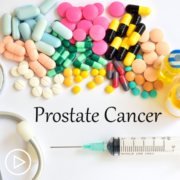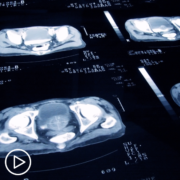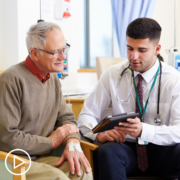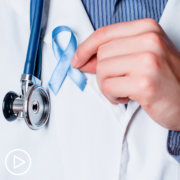What does it mean to thrive with advanced prostate cancer? Dr. Rana McKay discusses the goals of advanced prostate cancer care, reviews current and emerging treatment options, and shares advice for playing an active role in healthcare decisions.
Katherine Banwell:
Hello and welcome. I’m Katherine Banwell, your host for today’s program. Today we’re going to focus on how patients can aim to live and thrive with advanced prostate cancer. We’re going to discuss treatment goals and the role patients can play in making key decisions. Before we get into the discussion, please remember that this program is not a substitute for seeking medical advice. Please refer to your healthcare team about what might be best for you. Well let’s meet our guests today. Joining me is Dr. Rana McKay. Dr. McKay, welcome. Would you please introduce yourself?
Dr. Rana McKay:
Of course. Thank you so much for having me. My name is Rana McKay and I’m a GU medical oncologist at the University of California San Diego.
Katherine Banwell:
Excellent. Thanks so much for taking time out of your schedule to join us. Since this webinar is part of PEN’s Thrive series, I’d like to ask you from your perspective, what do you think it means to thrive with advanced prostate cancer?
Dr. Rana McKay:
That’s a very good question and I think that’s what um, a lot of patients want to actually you know, do in their day-to-day existence. I think it means that they are combatting their disease. They’re taking a proactive role in um, you know, uh tackling um, their illness. They um, are uh, attentive to sort of doing the activities of daily living that really bring them joy and satisfaction and happiness and setting up a treatment plan that is a mutually agreed upon treatment plan with their clinician. That they have buy-in on. That their caregivers have buy-in on. That allows them to do the things that they love to do while keeping their cancer at bay.
Katherine Banwell:
Okay. Thank you for sharing your insights. Before we move onto treatment, I mentioned that this webinar is focused on advanced prostate cancer. What does it mean for prostate cancer to be considered advanced?
Dr. Rana McKay:
So, generally what that means is that the cancer may have spread outside of the body – outside of prostate to other parts of the body such as the bone or the lymph nodes which is a common location where prostate cancer um, uh, can go. Additionally, it may mean that the cancer may have come back after um, it was initially treated with an intent um, to cure um, a patient. But then you know the PSA demonstrates um, that you know, there’s a rise in the PSA and the cancer is recurrent.
Katherine Banwell:
As you mentioned uh, appropriate treatment is part of thriving. We’re going to talk about treatment approaches. But first, how would you define treatment goals?
Dr. Rana McKay:
So, you know when I look at defining treatment goals it’s focusing on what do we wanna achieve from the standpoint of the cancer? Meaning, you know, what are objectives that are associated with patients living longer?
And then what are objectives um and strategies that we can set-up to make sure that patients are living better? So, I think the treatments are basically set-up to basically help you achieve those two goals. What can we do to help you live longer and feel better?
Katherine Banwell:
Yeah. Well, let’s walk through the types of treatments that are used today to treat advanced prostate cancer. What are the treatment causes and who are they appropriate for? Let’s start with surgery, for instance.
Dr. Rana McKay:
So, surgery is something that’s utilized uh, early on when people are diagnosed with cancer. It tends to be utilized when the cancer has not necessarily spread to other parts of the body but is still localized within the prostate itself or maybe there’s just some little bit of breakthrough in the capsule. Sometimes it can be used in people who have involvement of the prostate cancer in the lymph nodes. But it’s generally not utilized in people who have cancer that’s spread to other parts of the body.
Katherine Banwell:
Mm-hmm. What about other treatment classes? What are they?
Dr. Rana McKay:
So, radiation can also be utilized. Radiation is a treatment modality that can be used for people with localized disease and um, also it can be utilized for people with advanced disease to treat the primary tumor.
Additionally radiation therapy can be used to help treat symptoms um, if there’s a bone lesion causing pain or other areas that are causing discomfort. Sometimes radiation to those areas um, can um, mitigate pain. When I think about the treatment classes for prostate cancer um, they generally break down into several categories. The first um, um, most predominant category is the hormonal therapy category. Hormonal therapies are really the backbone of treatment for men with prostate cancer and they include the more traditional hormonal therapies that really work to just drop testosterone. So, just LRH – L – LRHA agonists and antagonists and also, they include um, newer hormonal therapies in the form of pills that really target um, strategies at also affecting testosterone function and testosterone production. Another class is also the chemotherapy agents. There are two FDA approved chemotherapies for prostate cancer that are life prolonging and um, uh there’s a certain role for uh, chemotherapy for people with advanced disease.
There’s also immunotherapy that can be utilized. Um, there’s a um, uh, vaccine therapy that’s actually one of the first uh, FDA vaccines for any solid tumor that’s proving in prostate cancer that can be utilized. There’s also radio pharmaceuticals.
So, these are specific agents that deliver um, a bits of radiation to specific areas. Whether it be radium 223 which targets the bone or the newest radio pharmaceutical, which was approved called uh, lutecium PSMA that um, basically delivers beta-radiation to little – sites of PSMA expressing cancer cells and the last category that I would highlight is the category of targeted therapy. There are uh, two targeted therapies for prostate cancer for patients who have like genomic alterations. Those include the drugs olaparib and rucaparib. So, as you can see there’s a wide spectrum of drugs that can be utilized to really keep this disease at bay.
Katherine Banwell:
Dr. McKay, for these treatment classes, what can patients expect as far as side effects?
Dr. Rana McKay:
Absolutely. So, I think side effects – discussing side effects is a really important part of the discussion for selecting any one given therapy and in general, I think um, when we talk about the hormonal therapies one of the side effects that people can get is largely fatigue.
But a lot of the symptoms are related to low testosterone. And so, that may mean muscle loss, bone loss, um, you know, uh, hot flashes, um, fatigue, decrease libido, um… So, you those are things to consider with hormonal therapies. With the chemotherapies, I think the big ones we worry about are fatigue, risk of infection, um blood counts dropping a little bit, people getting tired, numbness and tingling in the hands and feet can occur, some swelling in the legs are common side effects for chemotherapy agents. With regards to the um, uh, immunotherapy with the vaccine therapy, it actually tends to be a fairly well tolerated treatment. Maybe some fatigue, rarely some dizziness or some lip – lip sensitivity, numbness with the – the process of kind of collecting the cells. But it actually tends to be fairly well tolerated.
The um, targeted therapies can cause fatigue. They can cause the blood counts to drop and can impact bone marrow function. There can be sometimes GI side effects. Nausea, um, rash, um and then the immune therapy, the pembrolizumab, that is FDA approved sometimes that can cause immune related adverse events which is kind of over activation of the immune system developing you know, what I’d call it as the itises. Colitis or pneumonitis which is inflammation of various organs and symptoms related to wherever that may be.
Katherine Banwell:
When should a patient consider a clinical trial as a treatment option?
Dr. Rana McKay:
So, I generally think that a patient should consider a clinical trial at almost every juncture that a – a clinical decision is being made. I think sometimes there’s this misperception that, “Oh. Clinical trials should only be utilized when I don’t have any other options.” Where in fact I would say clinical trials should be an option to discuss every single time a treatment is being changed. Um, because you know the ultimately the goal is to make sure patients are as I said, living longer and living better and um, you know, making sure that clinical trials are an option on the table at every juncture is really a key step in that process.
Katherine Banwell:
What are the benefits of being part of a clinical trial?
Dr. Rana McKay:
So, I think there’s a lot of benefits. I think um, you know, uh for patients with advanced disease it may provide access to drugs that they otherwise not necessarily have access to.
Um, so the standard of care therapies you know, we can prescribe those at any juncture. They’re standard of care. But clinical trials um, really offer an opportunity to experiment with a uh, uh another agent um, and doesn’t necessarily take away from the standard of care options.
I think um, the other thing is you know, I think a lot of patients with advanced prostate cancer, they um, they – want to give back to the community. They want to leave a legacy. They want to contribute to the science. They wanna be a part of that mission to make tomorrow better than today for men with prostate cancer and I think participating in clinical trials can really help achieve that goal. Um, and also benefit the individual as well.
Katherine Banwell:
What about emerging treatments? Are there any that patients should know about?
Dr. Rana McKay:
Absolutely. So, there’s a lot of treatments that I think are currently undergoing extensive testing.
There’s um, additional uh, targeted therapies um, for example CDK46 inhibitors that are being tested broadly in the um, um hormone resistant space and the newly diagnosed setting. Um, there’s um, also AKT inhibitors. There are other targeted therapies that are being tested. There’s novel hormonal treatments that target resistant pathways like the antigen receptor degraders. There’s a slew of immunotherapy options um, cell therapy, bi-specific antibodies that are also being tested. So, there’s a lot of really exciting and novel treatments that are looking at overcoming resistance for people with advanced disease.
Katherine Banwell:
Hm. Do you recommend that men with advanced prostate cancer get the COVID vaccines and the boosters?
Dr. Rana McKay:
Very good question and in general, I do recommend the vaccines. Especially for patients with advanced disease and those that are on therapy. Um, several studies have demonstrated that patients with cancer are at increased risk of having complications related to COVID and particularly patients that are on active treatment with cancer are at even greater riskSo, um, I would definitely recommend vaccination as a preventative strategy to prevent really complications related to COVID.
Katherine Banwell:
Mm-hmm. Thanks, Dr. McKay. That’s helpful information. Since prostate cancer affects men differently. Let’s review what factors could impact which treatment is right for their individual disease. How about we start with symptoms?
Dr. Rana McKay:
So, yeah. I mean absolutely. I think symptoms are definitely something that plays into effect.
Um, sometimes when patients are first diagnosed, they may not have symptoms. But, you know, boney pain. Um, Symptoms of urinary obstruction. You know, there’s specific um, uh, treatments and uh, strategies that we can deploy to help with those kinds of things. Um, you know other factors that I think I – we take into account when we’re making decisions about which agent should any one patient receive is where are there sites of metastases? Um, is there disease just in the bones and lymph nodes or are there other organs involved? Um, what’s the genomic make-up of the tumor? Um, there are certain treatments that we would utilize if someone had a certain specific you know, uh genetic make-up for their tumor. You know, other things that are really important are what kind of drugs has the patient seen before or has that tumor been exposed to? Because that also helps us strategize for what to give them in the future.
Katherine Banwell:
Do you take into consideration the patient’s comorbidities and their age and overall health? Things like that?
Dr. Rana McKay:
Absolutely. Yeah. I think we need to absolute take that in account. I think – I think age is one thing. But I think functional status is um, just as – as important as the actual number itself because people are very different regarding um, the things that they can do at various uh, age limits and so, that absolutely takes into account weighing the side effects of any given therapy and how that may interact with someone’s existing comorbidities and it may be something that we have to work with a team of other doctors to basically make sure that there is comprehensive, well-rounded care for any one patient.
For example, some therapies may increase the risk of hyper-tension or increase the risk of volume overload and so, if somebody has issues with that already we may have them see a cardiologist so we can make sure that um, you know, we’re kind of addressing the totality of the patient experience.
Katherine Banwell:
What do you mean by volume overload?
Dr. Rana McKay:
Uh, volume overload I mean if they’ve got too much fluid on board. So, maybe if they have heart failure or something like that and we have a therapy that’s gonna cause them to retain fluid. And so then, we would have to work with a cardiologist to make sure that they don’t run into issues.
Katherine Banwell:
Right. That makes sense. What are the common symptoms of advanced prostate cancer?
Dr. Rana McKay:
So, um, you know, I would probably say there common symptoms and just because somebody has these symptoms doesn’t mean they have prostate cancer. But fatigue, weight loss, urinary symptoms, trouble urinating, you know, benign prostatic atrophy is one of the most common symptoms or most common conditions in men and um –
Katherine Banwell:
What does that mean?
Dr. Rana McKay:
Um, so sort of benign enlargement of the prostate. Um, you know that’s a common phenomenon that happens with age and it can affect somebody’s ability to urinate.
Um, but um you know uh, sometimes with prostate cancer it can also impact somebody’s ability to urinate. Their stream, their flow. Um, they may have rectal discomfort. They may feel tired, boney pains. Usually, I tell patients you know persistent progressive symptoms that are just you know not going away, not getting better. Those need to be looked at by a physician to evaluate further.
Katherine Banwell:
Mm-hmm. You mentioned genetic mutations. Should patients advocate for genetic testing if they haven’t had it already?
Dr. Rana McKay:
Um, it all depends on uh, what kind of uh, where they are in the process. So, for most men who have advanced disease, they should undergo genetic testing of both their tumor, and it is also recommended to do hereditary testing for patients who have advanced disease. Um, and that information may not necessarily be utilized at the exact time that the test is done.
But it may be utilized down the road for treatment options at a later time point. Um…
Katherine Banwell:
Mm-hmm. Once a man is undergoing treatment for advanced prostate cancer how are they monitored to see if it’s actually working?
Dr. Rana McKay:
So, a lot of ways. So, one is by just you know, visiting with the patient. Making sure that their symptoms are in check. Making sure that they’re not developing new um, aches or pains that are worrisome. It’s by checking their labs um, in addition to their organ and bone marrow function. We would check their PSA. Um, and PSA isn’t the whole story. But it is one factor that contributes to us determining whether treatment may or may not be working. It’s also doing intermittent scannings. So, um, you know, uh, CT scans of the organs, of the lymph nodes. Bone scan and now we actually have PSMA based imaging which can be integrated to help um, assess uh, where the disease is and um, not yet being utilized to assess whether something is working because we haven’t really defined the criteria there.
But um, it can be utilized as well.
Katherine Banwell:
Mm-hmm. Dr. McKay, how would you define precision or personalized medicine and how close are we getting to personalized medicine for advanced prostate cancer?
Dr. Rana McKay:
Yeah. So, what I – how I define it is the right treatment for the right patient at the right time. It’s basically you know, based off of somebody’s genomic profile of their tumor and ideally that genomic profiling is done close to the time that that treatment is being initiated. So, within six months or twelve months of somebody starting a given therapy we understand the genetic make-up of the tumor. The tumor has you know, for example a BRCA1 alteration and we know that olaparib is a drug that can be utilized and has demonstrated efficacy for people that have that mutation and then we would use that agent. So, it’s basically trying to um, personalize therapy based on the genomic information of that tumor.
And um, I think we are getting there. There are actually trials now that are being launched that are bio-marker driven trials with bio-marker selected therapies for patients based on -off of not just DNA but also RNA to help with um, allocating a given therapy.
Katherine Banwell:
What do you feel are the common obstacles to care for a man with advanced prostate cancer?
Dr. Rana McKay:
So, I think that there can be a lot of obstacles with regards to um, you know, comprehensiveness of the care. You know it’s one thing to sort of, “Okay. This is the next therapy to treat you with.” But there’s a lot of side effects that can happen with any one given therapy and ensuring that there is open dialogue between um, uh a man and his – his clinician and caregivers.
You know, I think that that can sometimes be a hurdle. Like that open communication can be so important. It’s not just about picking the next best drug but it’s ensuring that there’s sort of comprehensiveness in care. I think a lot of um, you know, patients they may not necessarily know and they’re really kind of dependent on their clinician to sort of go through the compendia of options that may be available and why one may be better than the other for any one given scenario. So, I think it’s like that shared decision-making, that open dialogue.
Um, you know, I think also thinking about advocacy networks, I think um, you know, I can say things until I’m blue in the face like this is what being on ADT feels like. But I think sometimes actually connecting with another patient whose gone through the same experience who can kind of weigh in from the patient perspective like what it actually feels like, I think is not to say a hurdle. But I think we can do a better job as a medical community of making those networking connections available for patients so they can be a part of a broader community of individuals like them going through the same thing they’re going through.
Katherine Banwell:
Yeah. It helps to know that there are others going through exactly what you’re going through or similar symptoms. We received a patient question prior to the program. What is the difference between my PSA level and Gleason score?
Dr. Rana McKay:
Yeah. So, very good question. So, Gleason score is something that is determined based off a pathologic assessment. So, it’s basically you know, a biopsy is done from the prostate or the – the surgical specimen from the removal of the prostate is looked at under the microscope and a Gleason score is based off what something looks like underneath a microscope and ideally, a Gleason score is given really only for the prostate – for tissue derived from the prostate.
So, if somebody has a bone biopsy for example or a lymph node biopsy, they’re not going to necessarily get a glycine score per se. It’s been – been validated from the prostate itself and ideally, also, an untreated prostate. So, if somebody has you know had radiation therapy and then has a biopsy, the Gleason score there is – there should not necessarily be a notation of what a Gleason score is. It’s really an untreated prostate. Now PSA is prostate specific antigen and it’s a protein that’s made from the prostate gland and it’s found in circulation. PSA doesn’t hurt any – the actual you know, molecule itself is – is innocuous. It doesn’t hurt anything. It’s just a marker of um, sometimes can be a marker of burden of disease in prostate cancer and I think sometimes we as clinicians do you know, you know a disservice to some patients because I think we fixate – we can fixate a lot on PSA.
But PSA is not the whole story and it’s one factor of several factors that we take into account in determining whether someone needs treatment or whether a treatment is working or not working.
Katherine Banwell:
Why should patients feel confident using their voice in partnering in their care? Do you have any advice?
Dr. Rana McKay:
Um, I mean it’s – it’s absolutely important for patients to share their perspective and for there to be shared decision making at every single juncture along the way. Even around decisions to not treat. So, you know, I think it’s a lot of um – there’s a lot of grays in prostate cancer and a lot of art in deciding what treatment to do and at what specific time and for any given patient given the values that that patient brings to the table, they may come back with a different decision compared to another patient. So, without the patient you know voicing what their values are it’s impossible to make a treatment decision.
So, it is so critically important to have that open communication with your clinician.
Katherine Banwell:
So, in addition to that – in conjunction with that, should men diagnosed with advanced prostate cancer consider a second opinion or consulting with a specialist?
Dr. Rana McKay:
I think it’s always a great idea to get a second opinion. Um, you know, I think that um, you know, it will only empower individuals um, when they seek sort of a second opinion to either confirm um what their physician has already told them and then they have reassurance that they’re on the right path or maybe provide some new um, novel insights that they can take into consideration and just think about how that could be applied to them. So, you know, I think that a second opinion is always really valuable.
I will balance that by saying um, sometimes it can be detrimental if there’s lots of opinions because I will say that coming to a consensus when there’s lots of different specialists that are involved, and everybody makes the soup a little bit differently –
Katherine Banwell:
Yeah.
Dr. Rana McKay:
Sometimes that I think that can actually um, hurt patients in being able to actually come to a decision because then they’re like, “I don’t know what decision to make. This person said do this. This person said do that. This person said do that.” Um, and so that can sometimes be um, detrimental. But a second opinion, I do always encourage it. I do always value it. But I always want the patient to bring it back to me so I can share with them and discuss, “Okay. I understand. This is why x said X-Y-Z. This still aligns. This still doesn’t.” They need a quarterback like you know, it’s one thing to sort of get second opinions. But I think every man with prostate cancer should have a quarterback that’s driving their care and advocating for them.
Katherine Banwell:
Yeah. How can patients find specialists near them?
Dr. Rana McKay:
So, um, I will say that they are national comprehensive cancer institutes. They’re all across the country in rural areas and not. I think um, you know finding the closest NCI designated comprehensive cancer center close to you is probably a good place to start and identifying who is seeing um patients with genetic urinary malignancies or prostate cancer at that facility is a good place. I think the prostate cancer foundation is an excellent advocacy group for patients with prostate cancer. They have a tremendous amount of resources um, to help connect patients with um, clinicians, and other resources um, in their journey with cancer.
Katherine Banwell:
How can caregivers best support their loved ones?
Dr. Rana McKay:
So, I think being present is one of the first things. Um, you know, I think that uh, um, you know, uh, being you know, supportive, being present.
Like you know, attending the doctor – doctor’s visits. It doesn’t necessarily have to be every single doctor visit. But those critical doctor visits where um, you know clinical decisions are being made. I think it’s really important also um, to there may be some hesitancy on the part of patients to sometimes be open or vocal with their clinicians about various aspects of what they may be experiencing at home, or they may be undermining or sort of – I think caregivers can help in sort of giving an outsider’s perspective. “Well, this is how things are going at home,” and “You know this is how things are,” and “These are the things that we value and we’re gonna go on this family trip,” and “This is a big-ticket item for us. So, how can we work around planning a treatment plan that allows us to do that?” So, I think it’s really important.
Katherine Banwell:
ASCO was held in June. Is there news from the conference that patients should know about?
Dr. Rana McKay:
Yeah. So, I think some of the biggest therapies in prostate cancer that was one of the newest therapies that was just FDA approved is um, Lutetium PSMA. It’s um, a radioligand therapy that targets specifically PSMA expressing cells. Um It delivers a little bit of beta radiation to those cells. Um, that therapy was approved this past Spring and there highlights at ASCO about the utility of this therapy. Um, and again, there’s a series of novel compounds that are being tested in prostate cancer not yet ready for prime time but a lot of exciting work that’s being done um, to try to get new drugs that work better for our patients.
Katherine Banwell:
Mm-hmm. Going back to ASCO and new developments, how can patients stay informed about research developments like – like these that happen at ASCO.
Dr. Rana McKay:
So, very – very good. I think there’s a lot of networks for people with prostate cancer. I think one like I mentioned, the prostate cancer foundation it’s a wonderful community. Um, that really focuses on making sure that up to date, you know, uh, evidence-based data is uh, distributed to patients in a manner that is – that makes sense. That’s there’s not a lot of medical jargon and so I think that the PCF is really a wonderful resource. Uh, ASCO itself also has um, you know patient interfacing you know, materials through their website.
American Cancer Society does as well. Um, the American Cancer Society can also be a wonderful resource for patients that are newly diagnosed or going through treatment.
Katherine Banwell:
Mm. Before we end the program, Dr. McKay, I wanted to ask. Are you hopeful that men can thrive with advanced prostate cancer?
Dr. Rana McKay:
Oh, I am absolutely hopeful that they can thrive. I mean that is um, the name of the game and I think there’s a lot of um, uh, people who can look to for motivation.
Um, uh, to basically show that despite treatment, despite having advanced disease patients can thrive and continue doing all of the things that they love that give them joy and satisfaction in their lives.
Katherine Banwell:
It seems like there’s a lot of progress and hope in the field which is good. Dr. McKay thank you so much for taking the time to join us today.
Dr. Rana McKay:
Of course. My pleasure.
Katherine Banwell:
And thank you to all of our partners. To learn more about prostate cancer and to get tools to help you become a proactive patient, visit powerfulpatients.org. I’m Katherine Banwell. Thanks so much for joining us today.




















